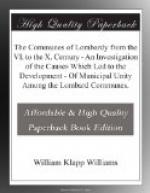Of the fines and forfeitures paid into the publicum, we find that a part went to the royal treasury and a part to the judex, and in some cases to the informer or the prosecuting officer; and at different times we find these proportionate amounts definitely defined—as, for instance, in the time of Charlemagne two parts went to the king and one part to the count who acted as judex;[36] this we know from two of the Lombard laws of that emperor.[37] In one of these,[38] speaking of those who evaded military service, he says: “Heribannum comes exactare non praesumat: nisi Missus noster prius Heribannum ad partem nostram recipiat, et ei,” the Count, “suam tertiam partem exinde per jussionem nostram donet."[39] We even find evidence of quite a large amount of liberty used by the duces in the ultimate disposal of property coming under their jurisdiction by forfeiture, the more powerful making use of it precisely as if it were private property. For example, in the Chronica Farfensis[40] appears a case judged by Hildeprandus, dux of Spoleto, in the year 787. A certain nun named Alerona, for having married a man named Rabennonus, “secundum legem omnis substantia ipsius ad Publicum devoluta est”; a little later Rabennonus, for having killed a man, “medietas omnis illius substantiae ad Publicum devoluta est.” In consequence, in poetic justice and for the good of his soul and the king’s, Hildeprandus quite arbitrarily presents “omnem praedictam illorum substantiam, qualiter secundum legem juste et rationabiliter, ad Publicum devoluta est,” to the Monastery of Farfa “pro mercede Domnorum nostrorum Regum et nostra.” Here, as in many other cases, we see the dux making gifts of property belonging clearly to the publicum, to persons favored by him and for his own benefit. Such a condition of affairs would certainly never have existed had public property been administered by authority other than that of the dux.
With regard to the revenues falling under the second of the rough divisions we have indicated—taxes and privileges—it is easier to see why differences of opinion should have arisen; for here, especially in matters relating to the collecting of taxes and dues, we are confronted with the names of a large number of lesser officials and subordinates of the judex, some of which are undoubtedly taken from the like officers existing in the old Roman curial system. But this survival of names, and in some instances of offices, need cause us no alarm, for it coincides exactly with the theory presented, namely, a continuance of many of the old forms of administration controlled by an entirely new principle of government. There are certain minor functions necessary for the support of the state which must be carried on in much the same manner, whatever be the character of the governing power—certain subordinate offices whose duties must be performed under a republic or under a despotism. Taxes may




